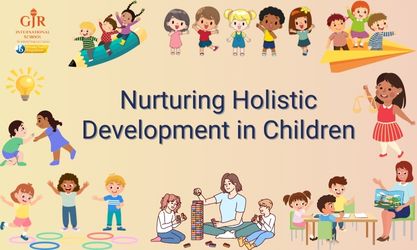
The concept of “ holistic child development ” goes beyond just acquiring knowledge. It encompasses the intertwining of physical socio cultural, mental and spiritual growth to establish a solid foundation for a child’s journey through life. This comprehensive approach aims to shape children into rounded individuals who can think critically and empathize with others.
It’s necessary to remember that children are more than their academic standing.In developing into well-rounded people, we ought to pay attention to all the various ways they acquire knowledge and grow. This is an approach that supports the growth of a child in all dimensions rather than just emphasising one aspect. This kind of development allows children to peer into their potential in a balanced way.
Innovative Curriculum: Our curriculum is designed to engage students not only intellectually but also socially and emotionally. We incorporate project-based learning, collaborative assignments and real-world problem-solving to make learning more relevant and impactful.
Emotional Support: We provide a supportive environment where students feel safe to express their feelings. Our counselling services and emotional well-being programs help students build resilience and handle stress effectively.
Extracurricular Activities: From sports to arts and community service, our extracurricular programs are aimed at enhancing student’s skills and interests beyond the classroom. These activities foster teamwork, creativity, and personal growth.
Physical Wellness: We encourage regular physical activity through structured physical education classes and sports. Our focus on healthy eating habits and wellness education ensures that students maintain a balanced lifestyle.
By actively participating in their child's development, parents can significantly enhance their child's overall well-being and success. Parents set the foundation for their child's development by creating a nurturing and supportive home environment. This includes:
Encouraging Curiosity: Please foster a love for learning by engaging in educational activities at home, such as reading together or exploring new subjects.
Emotional Support: Try to be a source of comfort and reassurance. Listen to your child's concerns and celebrate their achievements, both big and small.
Creating a Learning Routine: Please establish a consistent homework routine and provide a quiet, organised space for studying.
Engaging in School Activities: Try to attend parent-teacher meetings, school events, and workshops. Your involvement shows your child that education is important and valued.
Healthy Habits: You shall provide nutritious meals and encourage regular physical activity, limit screen time and promote outdoor play.
Improved Mental Health: Holistic approaches often include stress management and mindfulness practices, which can reduce anxiety and improve overall mental well-being.
Enhanced Interpersonal Skills: Encourages teamwork, communication, and conflict resolution skills, which are crucial for personal and professional success.
Increased Motivation and Engagement: By addressing diverse interests and talents, students are more engaged and motivated in their learning process.
1. Incorporate Mindfulness: Introducing mindfulness practices in the form of meditation and deep breathing exercises can help students manage stress and improve concentration.
2. Promote Physical Activity: Physical education should be an integral part of the curriculum, emphasizing the importance of regular exercise and physical well-being.
3. Encourage Creative Expression: Art, music, and drama classes provide students with avenues to express themselves creatively, fostering emotional intelligence and self-awareness.
4. Foster a Supportive Environment: Schools should create a safe and nurturing environment where students feel comfortable discussing their emotions and seeking help when needed.
5. Peer Support Groups: Establish peer support groups where students can share their experiences and learn from each other’s perspectives
Together with educators and the community, parents play a vital role in shaping confident, resilient, and capable individuals.At our school, we are dedicated to nurturing every aspect of our student’s development.
By embracing a holistic approach, we aim to create a learning environment that supports intellectual, emotional, social, and physical growth. We believe that this comprehensive approach equips our students with the skills and confidence they need to thrive in all areas of life. Let’s continue to work hand-in-hand to nurture our children’s growth and prepare them for a bright and balanced future.